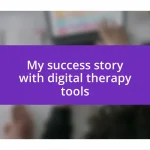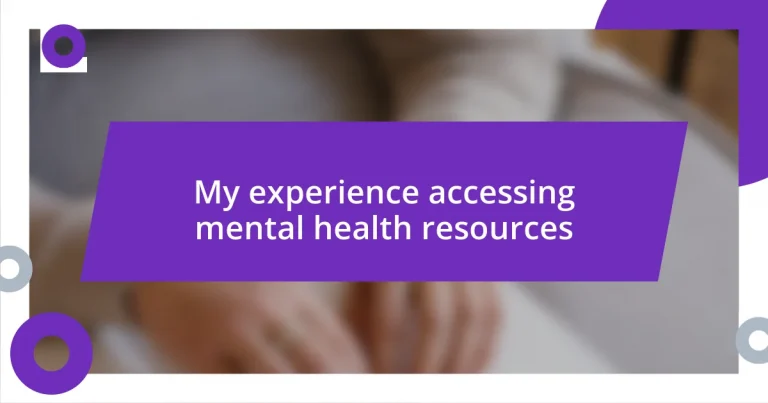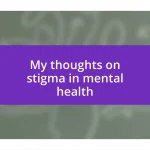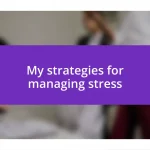Key takeaways:
- Exploring various mental health resources, including therapy, support groups, and online platforms, can significantly enhance one’s mental health journey.
- Identifying personal mental health needs through reflection, journaling, and discussions with others is crucial for effective support and therapy selection.
- Sharing experiences and stories within communities fosters connection, reduces isolation, and encourages vulnerability among individuals facing mental health challenges.
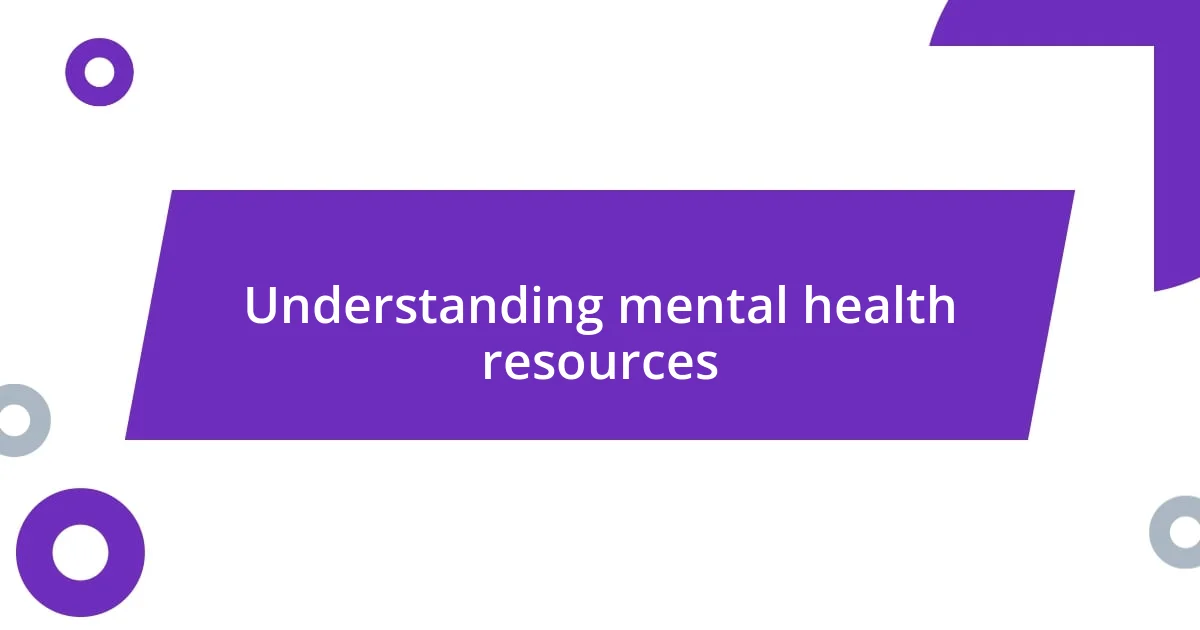
Understanding mental health resources
Mental health resources can sometimes feel overwhelming, but they’re incredibly valuable. When I first sought help, I found myself confused by the sheer number of options available. It’s easy to wonder, “Where do I even begin?” Understanding the different types of resources—like therapy, support groups, or helplines—can be a game changer in navigating your mental health journey.
During my experience, I discovered that not every resource fits every person. For instance, I initially thought individual therapy was the only route. However, attending a group session helped me realize how powerful it is to connect with others who understand what I’m facing. It’s those moments of shared vulnerability that really bring the value of these resources to light.
It’s also important to consider accessibility. I remember the relief I felt when I found online therapy options; they provided the flexibility I needed. How can we make mental health resources more approachable for everyone? I believe incorporating various formats—like apps, hotlines, and community programs—can bridge the gap and ensure that more people feel empowered to seek help.
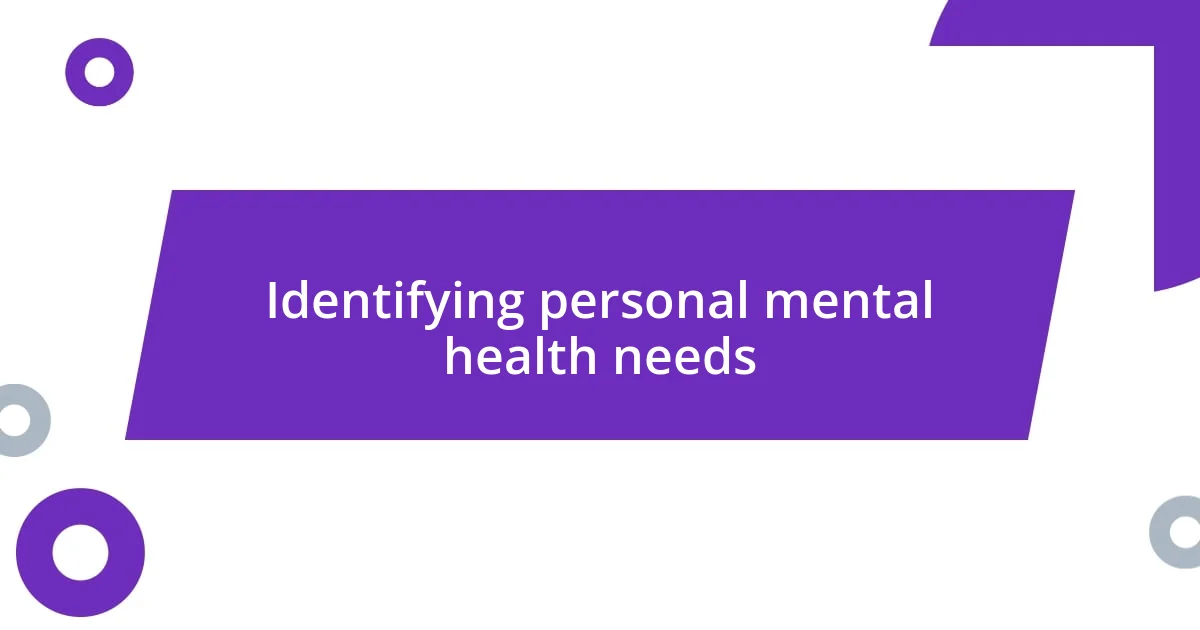
Identifying personal mental health needs
Identifying my personal mental health needs was a journey that required deep reflection and honesty. Initially, I struggled to pinpoint exactly what I was feeling—was it anxiety, depression, or something else? Once I started journaling my thoughts and emotions, I began to see patterns emerge. For example, I noticed that certain social situations triggered my anxiety, which helped me understand that I needed support in managing social interactions.
In my experience, talking to friends who had accessed mental health resources played a crucial role in this identification process. Hearing their experiences made me realize that my needs were valid and that I wasn’t alone in my struggles. I remember a friend mentioning how she hesitated to seek help because she didn’t recognize her own burnout until it was nearly overwhelming. This helped me shift my perspective and recognize the importance of self-awareness in seeking support.
Taking that first step to articulate my needs was liberating. I started researching specific therapies that resonated with my situation, from Cognitive Behavioral Therapy to mindfulness practices. This exploration built my confidence, empowering me to seek resources that were genuinely aligned with my mental health journey.
| Needs | Examples |
|---|---|
| Anxiety management | Mindfulness techniques, therapy |
| Depression support | Support groups, counseling |
| Social connection | Group therapy, community events |
| Accessibility | Online therapy, hotlines |
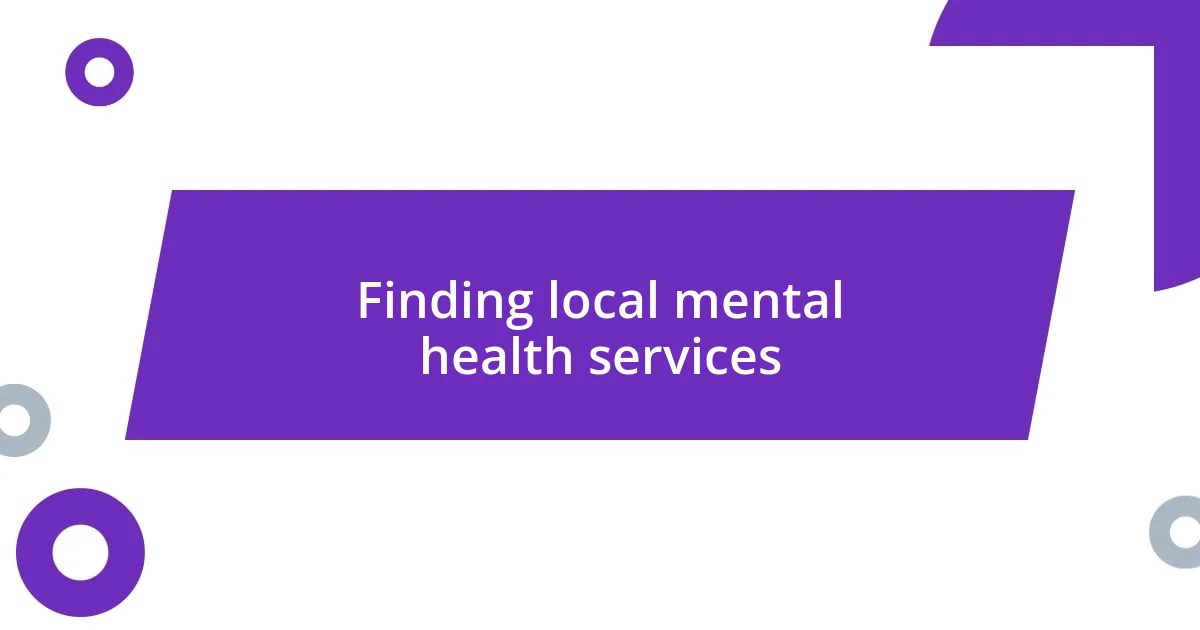
Finding local mental health services
Finding local mental health services can feel daunting, but I learned to break it down step by step. When I first began my search, I started by visiting websites like Psychology Today to find therapists in my area. The filters available allowed me to narrow down options based on specialty, insurance, and even gender preference, which made it much easier to find someone who felt like a good fit.
Here are some additional strategies I’ve found useful in locating local services:
- Community Health Centers: Many offer sliding scale fees based on income, making them a great option for affordable care.
- Local Nonprofits: Organizations in my area host support groups and workshops that can be invaluable.
- Workplace Programs: Some employers provide Employee Assistance Programs (EAPs) that offer a limited number of free therapy sessions.
- Universities: If you’re near a college, many have counseling centers that offer services to the public, often at reduced rates.
Using these resources helped me feel less overwhelmed and more supported in my journey. I remember feeling a mix of trepidation and hope when I finally reached out for that first appointment. It’s often those initial connections that can make all the difference.
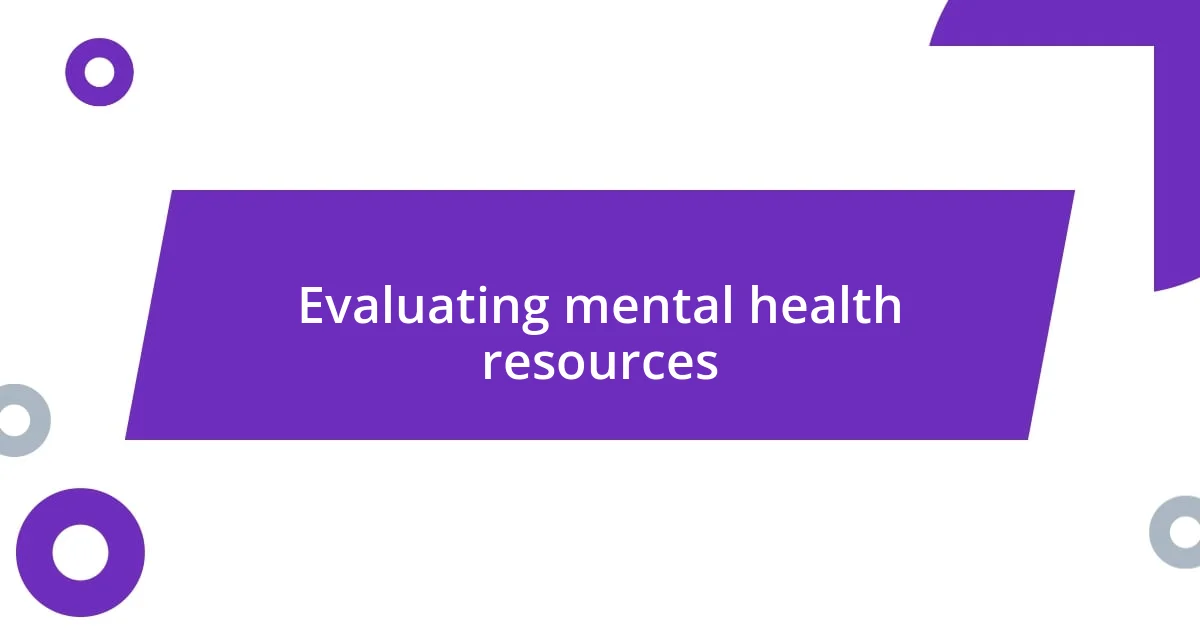
Evaluating mental health resources
Evaluating mental health resources requires a careful consideration of various factors. I remember feeling overwhelmed by the sheer volume of options out there. It wasn’t just about finding a therapist or support group; I had to think about what methods resonated with me. Would I prefer a more traditional approach like therapy, or was I drawn to alternative options like art therapy? Asking myself these kinds of questions helped narrow my focus.
As I delved deeper into evaluations, I learned the importance of checking credentials and approaches. For instance, when browsing profiles of potential therapists, I looked for not just qualifications but also their therapeutic style. Did they incorporate mindfulness practices, or did they lean more toward cognitive behavioral techniques? This isn’t just academic—finding a therapist whose style matched my expectations felt like a huge relief, almost like discovering a friend who understood me without judgment.
Another aspect that played a significant role in my evaluation was the reviews and testimonials from other clients. Reading about others’ experiences provided invaluable insights into what I might expect. I often thought, wouldn’t it be great to know someone else’s journey before embarking on mine? By considering their feedback, I felt more empowered to make informed decisions, which ultimately contributed to a more supportive experience in my mental health journey.
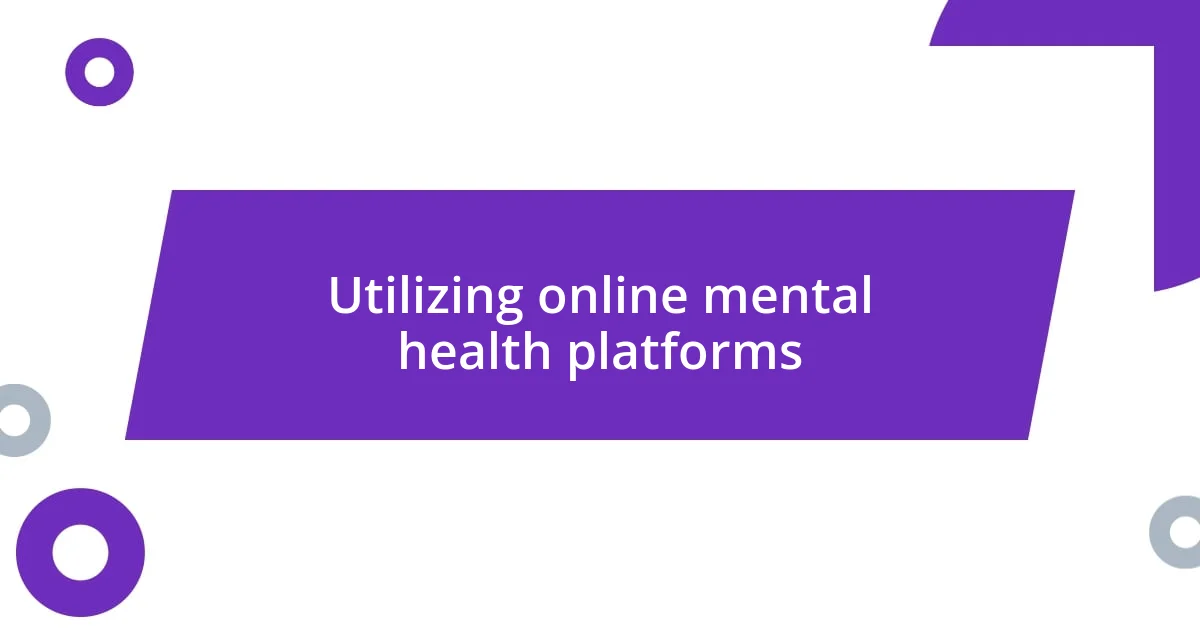
Utilizing online mental health platforms
Utilizing online mental health platforms has transformed my approach to seeking help. I remember first feeling hesitant about jumping into the digital realm of therapy. But when I discovered platforms like BetterHelp and Talkspace, I found the accessibility they offered was a game changer. It felt empowering to know I could connect with a therapist from the comfort of my home, especially during those moments when stepping outside felt overwhelming.
After my initial hesitation, I actually embraced the convenience these platforms provided. One night, after a particularly stressful week, I scheduled a session just 30 minutes prior. It was amazing to realize that I could have therapeutic support whenever I needed it. I often wondered, how did I ever manage without this option? Having the flexibility to communicate via chat, video, or even audio can fit seamlessly into a busy or unpredictable schedule.
What truly stood out to me was the diverse range of specialists you can access online. When I was navigating feelings of anxiety around work, I specifically sought out therapists who specialized in career counseling. Seeing lists of therapists with various focuses made me feel like I had more control over my mental health journey. I even found a therapist who incorporated my interest in mindfulness into sessions, which was a delightful surprise. The ability to choose someone whose approach aligns with my preferences has made the entire experience more personal and effective.
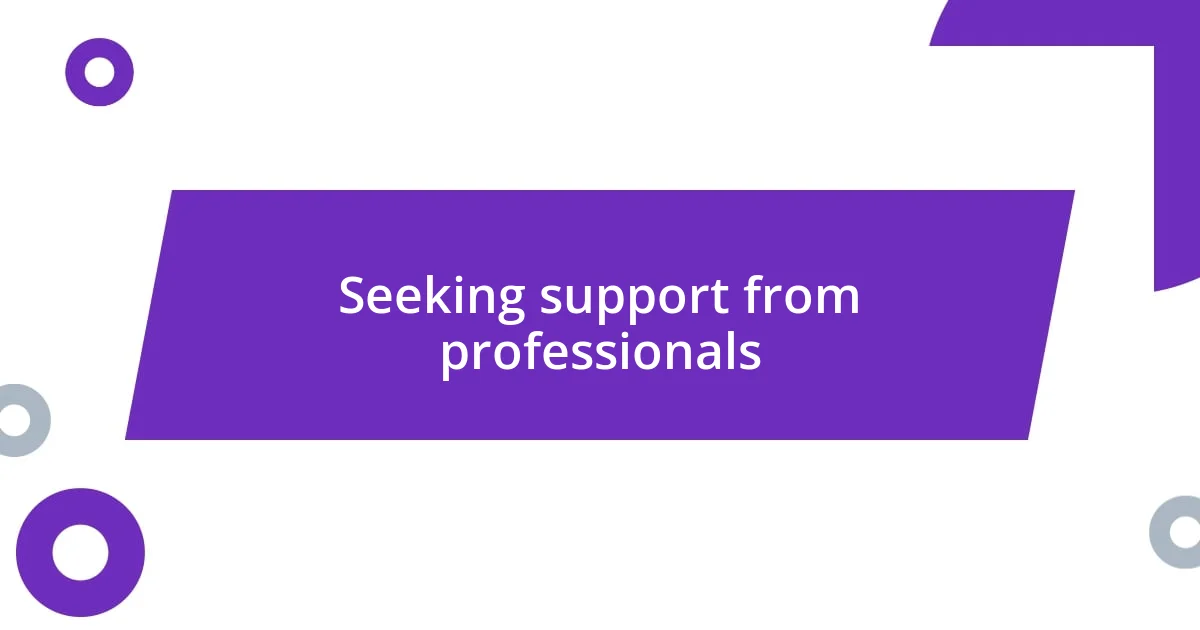
Seeking support from professionals
Seeking support from professionals can sometimes feel like stepping into uncharted territory. I remember my first visit to a therapist; my stomach was in knots. It’s a vulnerable act to share your innermost thoughts with someone you barely know. But the moment I opened up about my struggles, I felt a wave of relief wash over me. Isn’t it incredible how just talking to someone can begin to lighten the burden of what you’re experiencing?
As I continued my journey with different therapists, each session became a revealing exploration of my self-worth and coping strategies. I distinctly recall a session where my therapist introduced me to the concept of mindfulness, an idea I had never considered before. It struck me like a lightbulb moment. Why hadn’t I thought about being present in my emotions rather than letting them consume me? This professional guidance not only expanded my toolset for managing anxiety but also made me realize the value of having someone skilled to challenge me on my perceptions.
The process of seeking professional support isn’t always linear; it can be filled with trial and error. I once met with a counselor who, although highly recommended, just didn’t mesh with my style. I later asked myself, what if I had let that experience deter me from trying again? Reflecting on it, I learned that finding the right fit is crucial in this journey. It reinforced the idea that persistence is essential. My quest for the right professional was a journey in itself—a lesson in resilience that ultimately led me to the support I needed.
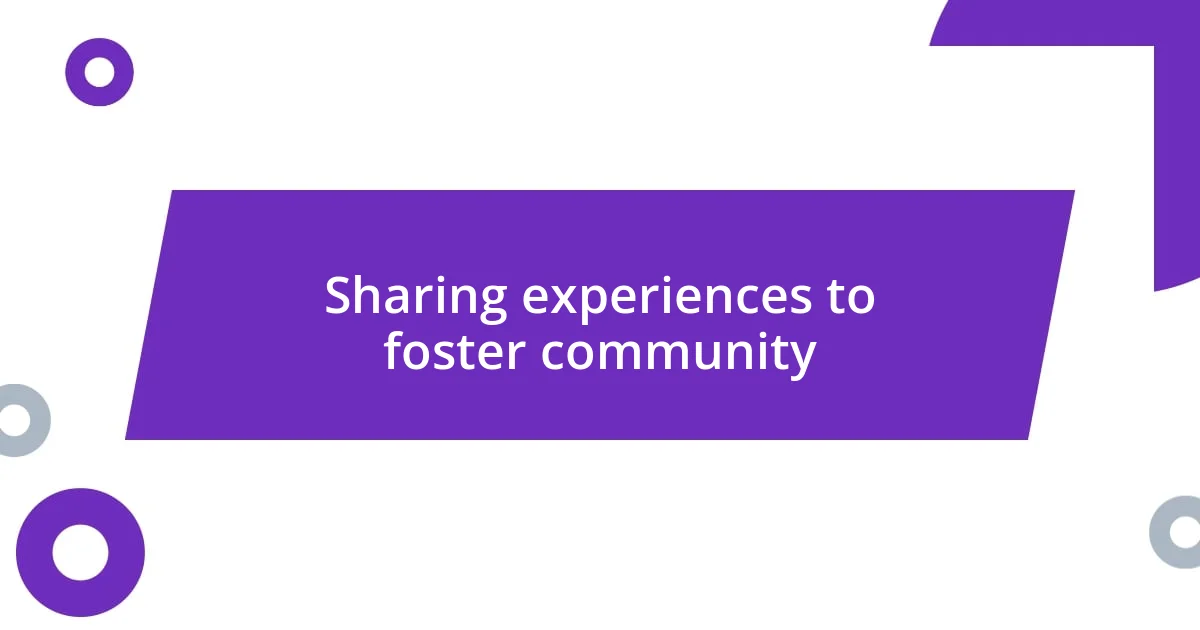
Sharing experiences to foster community
Sharing personal experiences can be a powerful way to build community. I remember joining an online support group where members openly talked about their struggles with mental health. Listening to others share their journeys not only made me feel less alone, but it also sparked a sense of camaraderie, as we bonded over shared challenges. Have you ever felt that spark of connection from someone else’s story? It’s amazing how these exchanges encourage vulnerability and foster trust among members.
Creating a space where experiences are shared openly can be transformative. In one instance, I decided to share my story about grappling with anxiety during a particularly stressful job transition. To my surprise, many responded with their stories, revealing their own struggles and triumphs. This exchange felt like a collective sigh of relief. We were no longer isolated in our experiences; we were a community, supporting one another in real-time. It reminded me of the strength that lies in togetherness.
It’s interesting how sharing can often lighten the emotional load we carry. I find myself reflecting on how discussing my journey at a local gathering led to conversations that transcended the usual small talk. Strangers became friends who could empathize and offer genuine support. Isn’t it wonderful how opening up can create such meaningful bonds? I truly believe that the more we share our experiences, the more we inspire others to do the same, creating a ripple effect of understanding and connection that benefits everyone involved.





